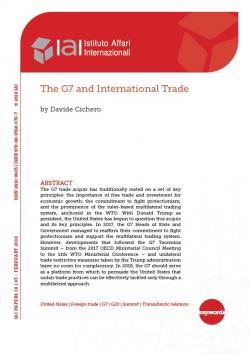The G7 and International Trade
The G7 trade acquis has traditionally rested on a set of key principles: the importance of free trade and investment for economic growth; the commitment to fight protectionism; and the prominence of the rules-based multilateral trading system, anchored in the WTO. With Donald Trump as president, the United States has begun to question this acquis and its key principles. In 2017, the G7 Heads of State and Government managed to reaffirm their commitment to fight protectionism and support the multilateral trading system. However, developments that followed the G7 Taormina Summit – from the 2017 OECD Ministerial Council Meeting to the 11th WTO Ministerial Conference – and unilateral trade restrictive measures taken by the Trump administration leave no room for complacency. In 2018, the G7 should serve as a platform from which to persuade the United States that unfair trade practices can be effectively tackled only through a multilateral approach.
-
Details
Roma, IAI, February 2018, 29 p. -
In:
-
Issue
18|03 -
ISBN/ISSN/DOI:
978-88-9368-070-7
Introduction
1. The G7 trade acquis
2. The Trump administration’s “America First” trade policy
3. The G7 Taormina Summit
4. Legacy of the G7 Taormina Summit
4.1 The G20 Hamburg Summit
4.2 Follow-up to the G20 Hamburg Summit
5. The Trump administration’s unilateral trade restrictive measures
Conclusion
Appendix: Chronology of major trade-related events in 2017
References



